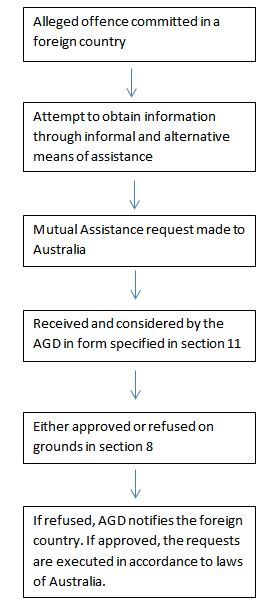What is mutual assistance?
Mutual Assistance is an avenue used by countries to provide and obtain formal assistance in criminal investigations and prosecution.
It allows Australian law enforcement authorities to cooperate with international enforcement agencies to investigate and prosecute offenders that are allegedly conducting illicit activities across borders.
The Mutual Assistance in Criminal Matters Act 1987 can work in conjunction with the Extradition Act 1988 to assist a foreign country with investigations into the conduct of a person in a manner that allows Australia to remain compliant with international obligations and fair trial principles. The information gleaned from such investigations can be used as the basis for an extradition request.
How can a foreign country make a mutual assistance request to Australia?
When a crime is committed in a foreign country, that country will attempt to rely on alternative and informal means of assistance. One of the alternatives to Mutual Assistance is known as police-to-police assistance and involves the cooperation between police in one country and police in another country. This is often used at the very early stages of investigation. A similar alternative is known as agency-to-agency assistance and is the cooperation between non-police counterparts.
Where coercive powers need to be used in order to obtain assistance, a formal mutual assistance request can be sent to Australia. It is at this point that the Foreign Central Authority will determine what assistance is required (please see below for a list of assistance Australia can provide).
The Attorney-General’s Department will receive and consider the request. The request must be in writing and have sufficient description of the nature of the matter as per section 11 of the Mutual Assistance in Criminal Matters Act 1987. Missing information will not invalidate the request, but a request for further information will be issued before it can be progressed. It also requires a description of the nature of the criminal matter, a summary of the relevant facts and a summary of the applicable law (including the penalty of for the offence).
When the request is received and progressed, a decision will made to whether it will be approved or refused. At this stage, the mandatory grounds for refusal will be taken into account, which can be found in section 8 of the Mutual Assistance in Criminal Matters Act 1987. If the request is refused, the Attorney-General Department will advise the foreign country.
If the request is approved, then it will be executed according to the assistance required, for example, search and seizure assistance would result in the police applying for a search warrant and then executing the search warrant. Material obtained is then transferred from the Australian Central Authority to the foreign country. The Australian Central Authority is a body within the Attorney-General’s Department that is responsible for mutual assistance casework.
What steps are involved in an MLA request to Australia?
What are the limitations to a request for mutual assistance?
Mutual Assistance is limited to criminal matters that arise under Australian law or that of a foreign country. Section 3 of the Mutual Assistance in Criminal Matters Act 1987 defines criminal matters as relating to:
When will an MLA request be refused by the Attorney-General?
The Commonwealth Attorney-General can refuse a request on the grounds listed in section 8 of the Mutual Assistance in Criminal Matters Act 1987 which include:
- Requests that relate to political offences
- Requests which may cause danger to a person being subjected to torture
- Requests that may cause prejudice on account of a person’s race, sex, sexual orientation, religion, nationality or political opinion
- The request relates to an act or omission that if had occurred in Australia, would be an offence under the military law of Australia
- The alleged act would not have constituted an offence against Australia law
- Prejudice would be cause to the sovereignty, security or national interest of Australia
- Offences which the death penalty may be imposed in the foreign country, unless the Attorney-General that assistance should be granted
- Where the person has been acquitted or pardoned in Australia or the person has undergone the punishment provided in respect of that offence.
- Assistance could prejudice an investigation in a criminal matter, the safety of a person in Australia or place an excessive burden on the resources of the Commonwealth or State.
What type of mutual assistance can Australia provide?
Under the Mutual Assistance in Criminal Matters Act 1987, the law permits:
- Taking evidence from witnesses or arranging for witnesses to travel and give evidence in foreign criminal proceedings – section 26.
- Section 15 allows foreign countries to request search and seizure. The Attorney-General may authorise a police officer to apply to a magistrate for a search warrant where there are reasonable grounds to believe that a thing relevant to the investigation is located in Australia: s38A Mutual Assistance in Criminal Matters Act 1987.
- Locating, restraining and recovering proceeds of crime – Part VI of the Act.
- Providing material in the custody of a law enforcement agency – section 15B.
- Warrants for the use of surveillance devices – section 15CA.




